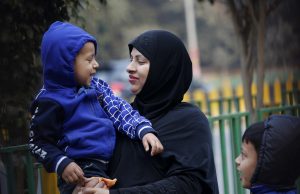“It has been two years since I heard from any employer,” said Madina Ashfaq, a post graduate in Clinical Psychology. “I have been a straight ‘A’ student since middle school. While others in my batch have gotten placed in reputed hospitals, I struggle to even get a call for an interview.”
Ashfaq is well-qualified, with glowing recommendation letters. She believes that there is a ceiling in the job market that she is not able to break, and recent research confirms her suspicions.
Recent research by LedBy Foundation, a non-profit professional leadership incubator for Indian Muslim women, reveals serious obstacles in the way of Muslim women in the job market. It found that for every two call-backs that a Hindu woman receives from job applications, a Muslim woman gets only one. “The net discrimination rate of 47.1% for Indian Muslim women relative to Hindu women, represents a massive discrepancy between call-backs for Muslim and Hindu women, proving that a significant hiring bias against Muslim women” exists in Indian society, the study says.
For the purpose of the study two “equally qualified résumés” were created for a fictitious Muslim woman, Habiba Ali, and a fictitious Hindu woman, Priyanka Sharma. The profiles didn’t carry any photograph. Over a period of ten months, 1,000 job applications were uploaded from each profile to 1,000 online job portals such as LinkedIn and Naukri.
Of the 1,000 jobs applied to, Priyanka received 208 positive responses, while Habiba received 103 positive responses. Despite similar qualifications and capabilities, Habiba’s profile received less favorable outcomes. Both received 88 positive responses from the same organizations, but Priyanka received 120 responses from unique organizations while Habiba received only 15. Habiba received only a rare follow-up call, whereas a large proportion of Priyanka’s responses were in form of call-backs, Recruiters reached out to Priyanka more proactively on her online profile. Habiba received only one positive response from recruiters coming upon her online job profile, whereas Priyanka received 15 such responses.
This highlights the different levels of proactivity that employers display when they scrutinized the two profiles and how Muslim women are bound to face more disadvantages due to their religious identity. Prejudice against Indian Muslim women for entry-level jobs is visible across industries and geographies.
The LedBy Foundation explains that several diversity, equity, and inclusion (DEI) initiatives have focused on improving women participation. But these efforts remain oblivious to the intersectionality of religious and ethnic identities and how they affect a woman’s wellbeing in society as an individual with multiple identities at the same time. A deep dive into the report shows how the Muslim community, especially its women, continue to be underrepresented in the formal work market.
Hindutva foot-soldiers and their facilitators in India’s Hindu nationalist Bharatiya Janata Party (BJP) government call for the economic boycott of Muslim vendors, daily-wagers, craftsmen, and other service providers. The LedBy Foundation’s research only confirms that this brutal anti-Muslim sentiment has reached the private sector as well, with recruiters thinking of Muslim women as less capable for jobs that they are fully qualified for.
Mrinal Mishra, a human resources professional based in Gurugram near New Delhi, dismisses the findings of the LedBy report. This is a “convenient” report, she said, where recruiters are being villainized. She claimed to have never discriminated against any applicant, even as she admitted that only nine out of her company’s 118 employees are Muslim.
Wajiha Noor had dreamed of becoming a fashion designer since the age of 10. She is a graduate in the field of fashion design and has internship experiences from three Mumbai-based designers. Originally from Bihar, Noor hails from a practicing Muslim family and wears a hijab. She was always encouraged to follow her dreams, she says, but after a whole year of getting various interview call-backs, she feels her hijab was a dealbreaker, wherever she went. While Noor would at least get interview calls, unlike Ashfaq who didn’t even get that far, religion-based discrimination by recruiters has ended both their dreams.
Indian Muslims are battling a variety of daily existential problems. Each day births a new challenges for them. The LedBy Foundation study underscores the fact that Islamophobia has percolated to India’s private sector.

































